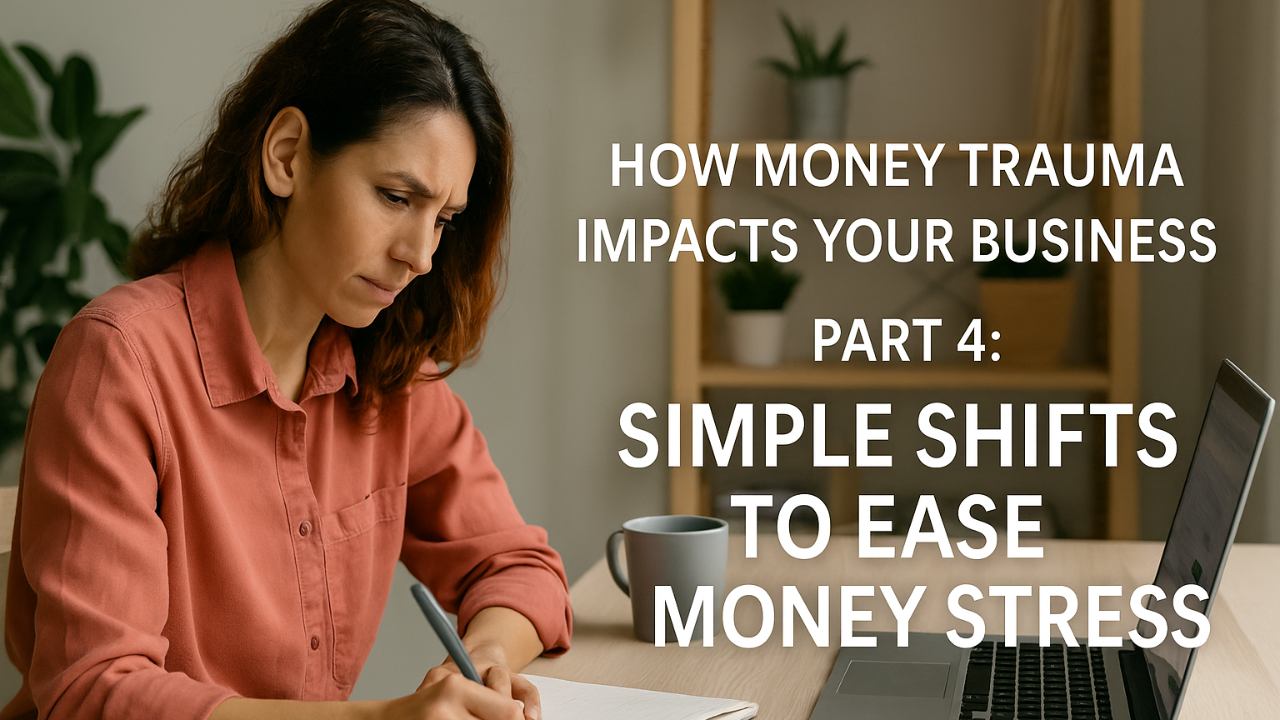Money Trauma in Business Part 4: Simple Shifts to Ease Money Stress
Sep 15, 2025
Most business owners are taught that the only way to ease financial stress is to make more money, cut expenses, or hire a better accountant.
While strategy is important, it’s not the whole picture. If your nervous system associates money with danger, no spreadsheet or sales forecast will stop the stress spiral.
Numbers can tell you where you stand, but they can’t stop the panic, avoidance, or overwork that money trauma triggers.
The truth is, sustainable leadership requires more than strategy. It requires teaching your body that money itself is not a threat. And that begins with small, practical shifts that rewire how you experience financial stress day to day.
Why Safety Comes Before Strategy
You can create the most sophisticated forecast, hire a CFO, or map out a 12-month plan—but if your body feels unsafe around money, you’ll still find yourself avoiding, overcompensating, or second-guessing.
Think about it:
-
Have you ever opened QuickBooks, felt your chest tighten, and immediately clicked out?
-
Hired a new employee after second-guessing, because fear of cash flow pushed you into urgency?
-
Said yes to misaligned clients simply because financial fear overrode your better judgment?
These aren’t failures of discipline or knowledge. They’re signs your nervous system is still linking money to risk. And until that link is softened, even the best strategy won’t stick.
Gentle Habits That Begin to Shift Money Stress
Gentle Exposure
Instead of avoiding your accounts for weeks and then binge-reviewing them in a panic, start with small, daily touch points. Open your financial app for sixty seconds—no action required. Simply look, breathe, and close it again.
Pair this with something soothing—a warm drink, soft background music, or a comfortable environment. Over time, your body learns: looking at numbers is not inherently dangerous. When money stops being a threat in your body, the numbers become data, not danger.
Anchoring Rituals
Rituals help teach your body that money can be approached with calm instead of panic. Before opening your books, take three intentional breaths. Light a candle. Play calming music. End your review by writing down one thing you’re proud of financially that week.
These small rituals don’t just change your personal experience - they change how your leadership feels to everyone around you.
Shifting the Story You Tell Yourself
Language matters. “I’m terrible with money” or “I’ll never figure this out” only reinforce avoidance and fear. Shift the script slightly:
-
From “I’m behind” → “I’m building at my pace.”
-
From “Money is stressful” → “Money is information.”
-
From “I’m bad with numbers” → “I’m learning new ways to engage with numbers.”
This isn’t about forced positivity. It’s about teaching your nervous system that money is not an enemy, but something you can relate to with curiosity and calm.
How Brainspotting Takes It Deeper
The practices above are powerful starting points, and sometimes the patterns around money feel too deeply wired to shift with habits alone.
That’s where Brainspotting comes in.
Brainspotting is a therapeutic process that helps you locate and release the stuck nervous system responses that keep money feeling like danger.
Instead of just managing stress, Brainspotting works directly with the subcortical brain and nervous system to resolve those root patterns - so you’re not bracing for impact every time you check your account.
When paired with gentle habits like exposure, rituals, and new language, Brainspotting helps the changes “lock in” at a deeper level. Your body no longer interprets money as a threat, which frees you to approach finances from vision instead of survival.
What Changes When You Lead From Calm
- When money stress doesn’t derail you, everything in your business shifts.
- You can look at your numbers without spiraling.
- You can set boundaries with clients without fear.
- You can discuss financial realities with your team without passing along panic.
- Creativity reopens because your brain is no longer trapped in survival mode.
This doesn’t mean you’ll never feel stressed again - entrepreneurship will always have ups and downs. But it does mean you’ll meet challenges with resilience instead of collapse. Calm stops being a luxury and becomes one of your most effective business strategies.
Ready to Step Into Calm Leadership?
If you’re tired of living in constant financial reactivity, I’d love to support you.
Book your consultation call and let’s begin rewriting your relationship with money together.
You don’t have to keep carrying the hidden costs of money trauma. There is another way forward.
Warmly,
Dawn
Stay tuned for Part 5, where we’ll explore how to integrate nervous system safety and financial strategy into sustainable rhythms that support both your leadership and your business growth.
P.S. If this resonated, share it with another entrepreneur you know. Sometimes the first step toward calm is realizing we’re not alone in the struggle.

